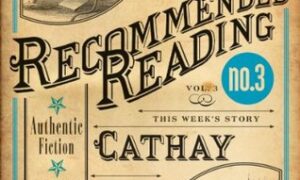 The Sasquatch Hunter’s Almanac by Sharma Shields
The Sasquatch Hunter’s Almanac by Sharma Shields
My rating: 3/5 cats



this is a charming, if uneven, little book-ride.
it covers about 60 years of a family’s bizarre experiences, beginning when the lonely and unsatisfied mother of a young boy named eli is seduced into the arms of a sasquatch known as “mr. krantz,” and goes off to live with him in the woods, leaving her family behind.
this lights an obsessive fire in eli that will burn for the rest of his life—not only does he become a podiatrist due to his preoccupation with feet, but he is even more preoccupied with the sasquatch, vowing to hunt down mr. krantz and take vengeance. he’s like ahab, but with TWO feet.
this book features the same brand of freewheeling magical realism that characterizes The Monsters Of Templeton; it’s a family drama where fantastic situations occur in the midst of the pain and struggle of everyday life, which goes on in its quiet and unremarkable way despite the appearance of unicorns, tentacle monsters, and a baby-snatching bird. as eli grows and starts his own family, he changes from a sympathetic boy who has lost his mother into a rather unpleasant and distracted man. he acquires two wives, two daughters, and grandchildren—but his sasquatch obsession will always take center stage.
each member of his family will encounter their own monster-scenario, both symbolic and very, very real. told through a number of different viewpoints, the book becomes a bit episodic—many of the chapters could stand alone as short stories and don’t really affect the larger narrative of eli and his quest, and the tone of these chapters varies as well—some are silly-funny, some are quiet sad domestic slices of life, and some are straight-up horror. shields’ first book was a story collection, and it doesn’t seem like she was fully able to adjust her style into novel form. what works in a collection—tonal variety, self-contained pieces, is rendered awkward in a novel.
in the same vein, her transitions between narratives is also awkward. i didn’t love the device of having each chapter start a few years further into the future from where the preceding one left off, leaving it up to whatever narrator was driving the chapter to fill in the gaps. it is unsatisfying to have chunks of story plopped out like that instead of experiencing the events in a more organic, cohesive structure.
all these quibbles aside, i really like her writing, so while i wasn’t crazy about this novel as a whole, its individual components have made me very interested in checking out her first book, because i think that the short story structure is perfect for her brand of storytelling, and i am eager to read more from her.
read my book reviews on goodreads







